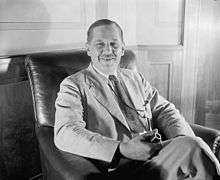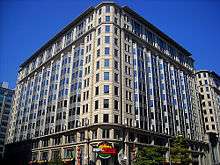Thurman Arnold
Thurman Wesley Arnold (June 2, 1891 – November 7, 1969) was best known for his trust-busting campaign as Assistant Attorney General in charge of the Antitrust Division in President Franklin D. Roosevelt's Department of Justice from 1938 to 1943. He later served as an Associate Justice of the United States Court of Appeals for the District of Columbia. Before coming to Washington in 1938, Arnold was the mayor of Laramie, Wyoming, and then a professor at Yale Law School, where he took part in the legal realism movement, and published two books: The Symbols of Government (1935) and The Folklore of Capitalism (1937). A few years later, he published The Bottlenecks of Business (1940).
Thurman Arnold | |
|---|---|
 | |
| Associate Justice of the United States Court of Appeals for the District of Columbia | |
| In office March 18, 1943 – July 9, 1945 | |
| Appointed by | Franklin D. Roosevelt |
| Preceded by | Wiley Blount Rutledge |
| Succeeded by | Bennett Champ Clark |
| United States Assistant Attorney General for the Antitrust Division | |
| In office 1938–1943 | |
| President | Franklin D. Roosevelt |
| Preceded by | Robert H. Jackson |
| Succeeded by | Wendell Berge |
| Personal details | |
| Born | Thurman Wesley Arnold June 2, 1891 Laramie, Wyoming |
| Died | November 7, 1969 (aged 78) Alexandria, Virginia |
| Education | Princeton University (B.A.) Harvard Law School (LL.B.) |
Early life and education
Thurman was born in the frontier ranch town of Laramie, Wyoming,[1] which grew to be a small city and location of the University of Wyoming. He was the son of Annie (Brockway) and Constantine Peter Arnold.[2] He began his university studies at Wabash College, but transferred to Princeton University, earning his Bachelor of Arts degree in 1911.[1] He earned his Bachelor of Laws from Harvard Law School in 1914.[1]
Career

Arnold served in World War I, rising to the rank of lieutenant in the United States Army (Field Artillery) and worked briefly in Chicago, Illinois before returning to Laramie, where he was a member of the Wyoming House of Representatives in 1921 and then mayor from 1923 to 1924.[3] He developed a reputation as a maverick lawyer.[3] He was a Lecturer at the University of Wyoming from 1921 to 1926. He was Dean of the at West Virginia University College of Law from 1927 to 1930. He was a visiting professor at Yale University from 1930 to 1931, and then professor of law at the same institution from 1931 to 1938. He was a special assistant to the general counsel of the Agricultural Adjustment Administration in 1933. He was an Assistant Attorney General of the United States Department of Justice from 1938 to 1943. As chief competition lawyer for the United States Government, Arnold launched numerous studies to support the antitrust efforts in the late 1930s.[3] He targeted the American Medical Association in their anti-competitive efforts against health plans.[3] The Roosevelt administration later de-emphasized antitrust enforcement, for the stated purpose of allowing corporations to concentrate on contributing to victory in World War II.[3]
Federal judicial service
Arnold was nominated by President Franklin D. Roosevelt on February 11, 1943, to an Associate Justice seat on the United States Court of Appeals for the District of Columbia (now the United States Court of Appeals for the District of Columbia Circuit) vacated by Associate Justice Wiley Blount Rutledge.[1] He was "kicked upstairs" by President Roosevelt to the Court of Appeals in order to get him out of the Antitrust Division.[3] He was confirmed by the United States Senate on March 9, 1943, and received his commission on March 11, 1943.[1] His service terminated on July 9, 1945, due to his resignation.[1]
Court of Appeals tenure
Although the District of Columbia Court of Appeals had some responsibility for review of decisions by federal administrative agencies, during Arnold's tenure the court's primary role was reviewing decisions of local trial courts involving routine civil and criminal matters arising in Washington, D.C. Arnold was never happy during his time on the court, resigning after only two years on the bench. As an explanation of his decision, he told observers he "would rather be speaking to damn fools than listening to damn fools."
Arnold & Porter
Arnold returned to private practice in Washington, D.C. where,[1] along with Paul A. Porter and Abe Fortas, he co-founded the law firm known today as Arnold & Porter.[4]
Personal and death
Thurman married his lifelong partner Frances Longan Arnold on September 4, 1917. They had two children, Thurman Jr. and George, both of whom enjoyed successful careers in the law. Nebraskan "Hugh Cox, famous as Thurman Arnold's chief deputy" and also as an early partner at Root Clark & Bird[5] (later Root, Clark, Buckner & Ballantine; later Dewey Ballantine, later Dewey & LeBouef) was attorney for Donald Hiss, brother of Alger Hiss. Both Cox and Hiss were partners at Covington & Burling, where he was called the "perfect advocate"[6]) during the Hiss-Chambers Case."[7][8][9]
Arnold died on November 7, 1969.[1]
Thurman Arnold Jr. established a law firm in Palm Springs, California in 1953.[10] Thurman Arnold Jr.'s son, Thurman Arnold III,[11] joined his father's law firm in 1982 and is currently practicing law with an emphasis on Family Law in Palm Springs, California. George Arnold married and raised a family with Ellen Cameron Pearson, daughter of columnist Drew Pearson and granddaughter of Cissy Patterson, owner of the Washington Times-Herald.
References
- Thurman Wesley Arnold at the Biographical Directory of Federal Judges, a public domain publication of the Federal Judicial Center.
- "The Political Graveyard: Lions, politicians, Connecticut". politicalgraveyard.com.
- Morgan, Ted (1985). FDR: A Biography. New York: Simon and Schuster. pp. 492, 664–665. ISBN 0-671-45495-1.
- "Arnold & Porter History Book".
- Meyer, Martin (1968). Emory Bruckner. Harper & Row. p. 141. Retrieved 29 October 2017.
- "A Brief Historical Note". Covington Burling. 2006. Retrieved 29 October 2017.
- Wing, Ky P. (2006). Competition Rules for the 21st Century: Principles from America's Experience. Kluwer Law International. pp. xxi. Retrieved 29 October 2017.
- Marbury, William L. (1981). "The Hiss-Chambers Libel Suit". Maryland Law Review. University of Maryland - Francis King Carey School of Law: 83. Retrieved 18 August 2017.
- Gesell, Gerhard A. (August 1984). My 'Jealous Mistress': 1932–1984 (PDF). (unpublished memoir). p. 32. Retrieved 29 October 2017.
- "Directory of Distinguished Attorneys Practice Areas". Retrieved 5 May 2013.
- "Thurman Arnold III". Retrieved 5 May 2013.
Sources
Biographical sources
- Arnold, Thurman. Fair Fights and Foul; a Dissenting Lawyer's Life.
- Arnold, Thurman (edited by Gressley, Gene M.). Voltaire and the Cowboy: The Letters of Thurman Arnold . ISBN 0-87081-073-1
- Gressley, Gene M. (1964). "Thurman Arnold, Antitrust, and the New Deal". The Business History Review. 38 (2): 214–231. doi:10.2307/3112073. JSTOR 3112073.
- Miscamble, Wilson D. (1982). "Thurman Arnold Goes to Washington: A Look at Antitrust Policy in the Later New Deal". The Business History Review. 56 (1): 1–15. doi:10.2307/3114972. JSTOR 3114972.
- Waller, Spencer Weber (2005). Thurman Arnold: A Biography. New York: New York University Press. ISBN 0-8147-9392-4.
- Thurman Wesley Arnold at the Biographical Directory of Federal Judges, a public domain publication of the Federal Judicial Center.
Primary sources
- Arnold, Thurman W. The Bottlenecks of Business. New York: Reynal & Hitchcock, 1940. ISBN 1-58798-085-1
- Arnold, Thurman W. The Folklore of Capitalism. New Haven: Yale University Press; London: Humphrey Milford/Oxford University Press, 1937; 1962, with new preface. ISBN 1-58798-025-8
- Arnold, Thurman W. The Symbols of Government. New Haven: Yale University Press, 1935; New York: Harcourt, Brace & World, 1962, with new preface. ISBN 9780156876063
External links
| Wikimedia Commons has media related to Thurman Arnold. |
- "Works by Thurman Arnold" – via Yale Law School Legal Scholarship Repository.
- Works by or about Thurman Arnold at Internet Archive
- Thurman Arnold at Find a Grave
- Arnold & Porter
| Legal offices | ||
|---|---|---|
| Preceded by Wiley Blount Rutledge |
Associate Justice of the United States Court of Appeals for the District of Columbia 1943–1945 |
Succeeded by Bennett Champ Clark |